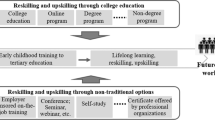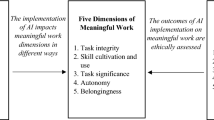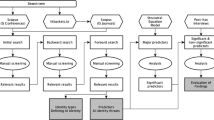Abstract
What are the socio-economic effects of the widespread introduction of robots, algorithms and digital technologies like artificial intelligence and machine learning? Following Frey and Osborne (London futures agiletown : the relentless march of technology and London’s response. Deloitte, 2014, Technol Forecast Social Change 114(C), 254–280, 2017, https://doi.org/10.1016/j.techfore.2016.08.019) we apply the computerization probabilities to occupations in Austria. We conclude that about 40% of the Austrian workforce is active in occupations that are very likely to undergo substantial changes regarding task structure, skill requirement and working environment in the future, causing challenges and opportunities. We also provide evidence that compared to men, women in Austria seem more likely to be affected by technological changes, with sectoral orientation playing a role. Following EBRD (Skills, employment and automation. Chapter 2 in: EBRD (2018): Transition Report 2018–19, European Bank for Reconstruction and Development, London, 2018),we see a broader move towards job polarization. We see this as distributive consequences of technological change and argue that the consequences of technology refashioning socio-economic development are influencing market processes, actors and inequalities. As in previous technological advances, coping with these changes will require efforts on the individual as well as on the political level.

Similar content being viewed by others
Notes
The work Frey and Osborne (2017) was already published in 2013 as a working paper. Inspired by this working paper, a series of similar works were created for other countries after 2013.
o*net: website that provides information on jobs in the US including task and skill profiles, for details see: https://www.onetonline.org/
This describes a tendency or a trend, but there are also significant deviations from the trend. We can find significant differences in income per capita between occupations with very similar computerization probabilities. When interpreting this relationship one should keep in mind that the estimated probabilities show purely technical (and not economic) potentials or possibilities. Therefore, more expensive workers do not automatically have higher probabilities. One can rather expect that occupations with lower technical replacement probabilities have by tendency higher income.
A comparison of our study with Nagl et al. (2017) with regard to the average probabilities instead of the proportion of employees with the highest probabilities shows that the results of both studies are quite similar.
The work Frey and Osborne (2017) was already published in 2013 as a working paper. Inspired by this working paper, a series of similar works were created for other countries after 2013.
References
Acemoglu D, Autor D (2011) Skills, tasks and technologies Implications for employment and earnings. In: Card D, Ashenfelter O (eds) Handbook of Labor Economics, vol 4. North Holland, Elsevier.pp, pp 1043–1171. https://doi.org/10.1016/S0169-7218(11)02410-5
Acemoglu D, Restrepo P (2020) Robots and Jobs: Evidence from US Labor Markets. J Political Econ 128(6):2188–2244. https://doi.org/10.1086/705716
Arntz M, Gregory T, Zierahn U (2016) The risk of automation for Jobs in OECD Countries: a comparative analysis. OECD social, employment and migration working papers, no. 189. https://doi.org/10.1787/5jlz9h56dvq7-en)
Austrian Court of Audit (2014a) Bericht des Rechnungshofes 2012 und 2013. (Retrieved from http://www.rechnungshof.gv.at/fileadmin/downloads/_jahre/2014/berichte/einkommensberichte/Einkommensbericht_2014.pdf)
Austrian Court of Audit Quoted from Statistics Austria. (2014b) Bericht des Rechnungshofes 2012 und 2013. (Retrieved from http://www.rechnungshof.gv.at/fileadmin/downloads/_jahre/2014/berichte/einkommensberichte/Einkommensbericht_2014.pdf)
Autor DH (2015a) Polanyi’s Paradox and the Shape of Employment Growth. NBER Working Paper No. 20485. https://doi.org/10.3386/w20485
Autor DH (2015b) Why are there still so many jobs? The history and future of workplace automation. J Econ Perspect 29(3):3–30. https://doi.org/10.1257/jep.29.3.3
Autor DH, Levy F, Murnane RJ (2003) The skill content of recent technological change: an empirical exploration. Q J Econ 118(4):1279–1333. https://doi.org/10.1162/003355303322552801
Bessen JE (2015) How computer automation affects occupations: technology, jobs, and skills. SSRN Electron J 16(2):293–321
Blinder AS (2009) How many US jobs might be offshorable? World Econ 10(2):41–78
BMVIT-Austrian Ministry for Transport Innovation and Technology (2016) Leichtfried: Plattform Industrie 4.0 unterstützt Betriebe beim Umstieg auf Digitalisierung [press release]. (Retrieved from https://www.bmvit.gv.at/presse/aktuell/nvm/2016/1212OTS0079.html)
Bonin H, Gregory T, Zierahn U (2015) Übertragung der Studie von Frey/Osborne (2013) auf Deutschland. Technical Report, ZEW Kurzexpertise No. 57. (Retrieved from https://ideas.repec.org/b/zbw/zewexp/123310.html)
Bowles J (2014a) Chart of the Week: 54% of EU jobs at risk of computerisation. Brussels: Bruegel. (Retrieved from http://bruegel.org/2014/07/chart-of-the-week-54-of-eu-jobs-at-risk-of-computerisation/)
Bowles J (2014b) The computerisation of European jobs. Brussels: Bruegel. (Retrieved from http://bruegel.org/2014/07/the-computerisation-of-european-jobs/)
Brzeski C, Burk I (2015) Die Roboter kommen. Folgen der Automatisierung für den deutschen Arbeitsmarkt. INGDiBa Economic Research. (Retrieved from https://www.ing-diba.de/pdf/ueber-uns/presse/publikationen/ing-diba-economic-research-die-roboter-kommen.pdf)
Bureau of Labor Statistics (2012a) Crosswalk between the International Standard Classification of Occupations (ISCO-08) and the 2010 Standard Occupational Classification (SOC). (Retrieved from https://www.bls.gov/soc/ISCO_SOC_Crosswalk_process.pdf)
Bureau of Labor Statistics (2012b) ISCO-08 x SOC 2010 Crosswalk. (Retrieved from https://www.bls.gov/soc/ISCO_SOC_Crosswalk.xls)
David B (2017) computer technology and probable jobs destruction in japan: an evaluation. J Jpn Internat Econ 43:77–87. https://doi.org/10.1016/j.jjie.2017.01.001
Davis R (2015) Industry 4.0 Digitalisation for productivity and growth. European Parliamentary Research Service, Briefing. (Retrieved from http://www.nature.com/doifinder/10.1038/nbt.2958%5Cn)
De la Rica S, Gortazar L (2016) Differences in Job De-Routinization in OECD countries: Evidence from PIAAC. IZA Discussion Paper No. 9736. (Retrieved from http://papers.ssrn.com/sol3/papers.cfm?abstract_id=2731999)
Decker F, Salomons A, van der Waal J (2017) Fear of robots at work: the role of economic self-interest. Socio-Econ Rev 15(3):539–562. https://doi.org/10.1093/ser/mwx005
Deloitte (2015) From brawn to brains: the impact of technology on jobs in the UK. (Retrieved from https://www2.deloitte.com/content/dam/Deloitte/uk/Documents/Growth/deloitte-uk-insights-from-brawns-to-brain.pdf)
Dengler K, Matthes B (2018) The impacts of digital transformation on the labour market: substitution potentials of occupations in Germany. Technol Forecast Soc Change 137:304–316. https://doi.org/10.1016/j.techfore.2018.09.024
Düll N, Bertschek I, Niebel T, Ohnemus J, Dworschak B, Zaiser H, Meil P, Vetter T (2016) Arbeitsmarkt 2030 Digitalisierung der Arbeitswelt. Fachexpertisen Zur Prognose 2016. (https://doi.org/https://doi.org/10.1007/s10273-011-1262-2)
EBRD (2018) Skills, employment and automation. Chapter 2 in: EBRD (2018): Transition Report 2018–19, European Bank for Reconstruction and Development, London, 34–45, (https://www.ebrd.com/news/publications/transition-report/transition-report-201819.html)
Fadel C (2014) Hype vs. Reality: A Roundtable Discussion on the Impact of Technology and Artificial Intelligence on Employment. McGraw Hill Financial Global Institute. (Retrieved from http://curriculumredesign.org/wp-content/uploads/MHFIGI-Hype-vs-Reality.pdf)
Frey CB, Osborne MA (2014) London Futures Agiletown : the relentless march of technology and London’s response. Deloitte. (Retrieved from https://www2.deloitte.com/content/dam/Deloitte/uk/Documents/uk-futures/london-futures-agiletown.pdf)
Frey CB, Osborne, M A (2017) The future of employment: how susceptible are jobs to computerization . Technological Forecasting and Social Change. 114: 254–280. https://doi.org/10.1016/j.techfore.2016.08.019
Goos M, Manning A, Salomons A (2014) Explaining Job Polarization: Routinization and Offshoring. Am Econ Rev 104(8):2509–2526. https://doi.org/10.1257/aer.104.8.2509
International Labor Office (2012) International Standard Classification of Occupations - Structure, group definitions and correspondence tables. Isco-08 (Vol. I). (Retrieved from http://www.ilo.org/wcmsp5/groups/public/@dgreports/@dcomm/@publ/documents/publication/wcms_172572.pdf)
International Labour Organisation (1982) Statistics of Labour Force, Employment, Unemployment and Underemployment. Geneva. (Retrieved from http://www.ilo.org/public/libdoc/ilo/1982/82B09_438_engl.pdf)
Jensen JB, Kletzer LG (2005) Tradable services: Understanding the scope and impact of services offshoring [with comments and discussion]. In: Bookings trade forum: Offshoring White-Collar Work, pp. 75–133. (Retrieved from https://www.jstor.org/stable/25058763)
Jensen JB, Kletzer LG (2010) Measuring tradable services and the task content of offshorable services jobs. In: Abraham, K.G., Spletzer, J.R., and Harper, M. (eds.) Labor in the new economy. University of Chicago Press, pp. 309–335 (Retrieved from https://www.nber.org/chapters/c10826.pdf)
A.T. Kearney Österreich (2016) Wertschöpfung 4.0 - Zusammenfassende Ergebnisse der Studie 2016. (Retrieved from https://www.atkearney.at/documents/3709812/9595981/Wertschoepfung+4.0.pdf/81174ee1-7498-4e06-bcfb-eed2795d24ba)
Kummer S, Moser R, Schwarzbauer W, Dieplinger M, Lueghammer W, Schachinger W, Tihany C, Vogelauer C (2016) IND4LOG4, Industrie 4.0 und ihre Auswirkungen auf die Transportwirtschaft und Logistik. Studie im Auftrag des Bundesministeriums für Verkehr, Innovation und Technologie (BMVIT), Wien. (retrieved from https://www2.ffg.at/verkehr/file.php?id=867)
Lorenz M, Rüßmann M, Waldner M, Engel P, Harnisch M , Gebert P, Justus J (2015) Industry 4.0. The Future of Productivity and Growth in Manufacturing Industries. Boston Consulting Group, April. (retrieved from https://www.bcg.com/publications/2015/engineered_products_project_business_industry_4_future_productivity_growth_manufacturing_industries)
McKinsey Global Institute (2016) Digital Europe: Pushing the Frontier, Capturing the Benefits. (retrieved from https://www.mckinsey.com/~/media/mckinsey/business%20functions/mckinsey%20digital/our%20insights/digital%20europe%20pushing%20the%20frontier%20capturing%20the%20benefits/digital-europe-full-report-june-2016.ashx)
Meraner A, Gumprecht D, Kowarik A (2015) Die neue Hochrechnung des Mikrozensus - Methodenbeschreibung. Wien: Statistik Autria. (Retrieved from http://www.statistik.at/wcm/idc/idcplg?IdcService=GET_PDF_FILEandRevisionSelectionMethod=LatestReleasedanddDocName=081240)
Nagl W, Titelbach G, Valkova K (2017) Digitalisierung der Arbeit: Substituierbarkeit von Berufen im Zuge der Automatisierung durch Industrie 4.0. (Retrieved from http://irihs.ihs.ac.at/4231/1/200800.pdf)
Nedelkoska L, Quintini G (2018) Automation, skills use and training, OECD Social, Employment and Migration Working Papers, No. 202, OECD Publishing, Paris. https://doi.org/10.1787/2e2f4eea-en
Office for National Statistics (2013) SOC2010 to ISCO08 mapping. (Retrieved from https://www.ons.gov.uk/file?uri=/methodology/classificationsandstandards/standardoccupationalclassificationsoc/soc2010/ug201002soc2010toisco08v2_tcm77-283163.xls)
OECD (2019) OECD Employment Outlook 2019: The Future of Work, Organization of Economic Co-operation and Development, Paris. (Retrieved from https://doi.org/10.1787/9ee00155-en
Osborne MA (2016) personal communication with the author via email, November 9, 2016.
Pajarinen M, Rouvinen P, Ekeland A (2015) Computerization Threatens One-Third of Finnish and Norwegian Employment. ETLA Brief 34, 1–8. (Retrieved from http://www.etla.fi/wp-content/uploads/ETLA-Muistio-Brief-34.pdf)
Peneder M, Bock-Schappelwein J, Firgo M, Fritz O, Streicher G (2016) Österreich im Wandel der Digitalisierung. Wien: WIFO Österreichisches Institut für Wirtschaftsforschung. (Retrieved from http://www.wifo.ac.at/jart/prj3/wifo/resources/person_dokument/person_dokument.jart?publikationsid=58979andmime_type=application/pdf)
Pfeiffer S, Suphan A (2015) Der AV-Index. Lebendiges Arbeitsvermögen und Erfahrung als Ressourcen auf dem Weg zu Industrie 4.0. Working Paper 2015#1 (draft v.1.0 vom 13.04.2015), Universität Hohenheim. (Retrieved from https://www.sabine-pfeiffer.de/files/downloads/2015-Pfeiffer-Suphan-draft.pdf)
Schwarzbauer W (2017) Die Digitale Evolution. FIW Policy Brief Nr. 34, Mai 2017. BMWFW. (Retrieved from https://www.fiw.ac.at/fileadmin/Documents/Publikationen/Policy_Briefs/34_FIW_PolicyBrief_Schwarzbauer_Digitalisierung.pdf)
Spath D, Ganschar O, Gerlach S, Hämmerle M, Krause T, Schlund S (2013) Produktionsarbeit der Zukunft-Industrie 4 0. Fraunhofer Verlag, Stuttgart. https://doi.org/10.1007/978-3-658-04682-8
Spitz-Oener A (2006) Technical change, job tasks, and rising educational demands: looking outside the wage structure. J Labor Econ 24(2):235–270. https://doi.org/10.1086/499972
Statistics Austria (2011) Systematik der Berufe ÖISCO-08. Wien: Statistik Austria. (Retrieved from http://www.statistik.at/wcm/idc/idcplg?IdcService=GET_NATIVE_FILEandRevisionSelectionMethod=LatestReleasedanddDocName=060991)
Statistics Austria (2016a) Arbeitsmarktstatistiken. Ergebnisse der Mikrozensus- Arbeitskräfteerhebung und der Offenen-Stellen-Erhebung. Wien: Statistik Austria. (Retrieved from http://www.statistik.at/wcm/idc/idcplg?IdcService=GET_NATIVE_FILEandRevisionSelectionMethod=LatestReleasedanddDocName=108448)
Statistics Austria (2016b) Data evaluation from the Micro-census Labor Force Survey 2015, received via email, August 3, 2016
Statistics Austria (2016c) Data from the micro-census labor force survey 2015. (Retrieved July 7, 2016, from http://statcube.at/statistik.at/ext/statcube/jsf/terms.xhtml)
WEF (2016) The Future of Jobs - Employment, Skills and Workforce Strategy for the Fourth Industrial Revolution (Global Challenge Insight Report), World Economic Forum., Geneva (Retrieved from http://www3.weforum.org/docs/WEF_Future_of_Jobs.pdf)
Wolter MI, Mönnig A, Hummel M, Schneemann C, Weber E, Zika G, Helmrich R, Maier T, Neuber-Pohl C (2015) Industry 4.0 and the consequences for labour market and economy: Scenario calculations in line with the BIBB-IAB qualifications and occupational field projections. IAB - Forschungsbericht. (Retrieved from http://doku.iab.de/forschungsbericht/2015/fb0815_en.pdf?utm_content=buffer7a917andutm_medium=socialandutm_source=linkedin.comandutm_campaign=buffer)
Wolter MI, Mönnig Al, Hummerl M, Schneemann C, Weber E, Zika G, Helmrich R, Maier T, Winnige S (2019) Wirtschaft 4.0 und die Folgen für Arbeitsmarkt und Ökonomie. Szenario-Rechnungen im Rahmen der fünften Welle der BIBB-IAB-Qualifikations- und Berufsprojektionen, Wissenschaftliches Diskussionspier des Bundesinstituts für Berufsbildung (BIBB) Nr. 200. (Retrieved from https://www.bibb.de/veroeffentlichungen/de/publication/download/10197)
Acknowledgement
The authors gratefully acknowledge the valuable comments received on earlier versions of this paper from the participants of the international conference “Digitalization and Smart Green (R)evolution” in November 2018 in Bratislava (Slovak Republic), the Annual Meeting of the Austrian Economic Association in April 2019 in Graz (Austria), the 30th Anniversary SASE Meeting in June 2019 in New York City (USA), Andreas Eder, Wolfgang Koller, and one anonymous reviewer. Bernhard Mahlberg wishes to thank the Austrian Research Promotion Agency (FFG) for its financial support (project number: 854187). The opinions expressed are the authors’ personal views and not necessarily those of the institutions the authors are affiliated with. The usual disclaimers apply.
Author information
Authors and Affiliations
Corresponding author
Additional information
Publisher's Note
Springer Nature remains neutral with regard to jurisdictional claims in published maps and institutional affiliations.
Rights and permissions
About this article
Cite this article
Haiss, P., Mahlberg, B. & Michlits, D. Industry 4.0–the future of Austrian jobs. Empirica 48, 5–36 (2021). https://doi.org/10.1007/s10663-020-09497-z
Accepted:
Published:
Issue Date:
DOI: https://doi.org/10.1007/s10663-020-09497-z




